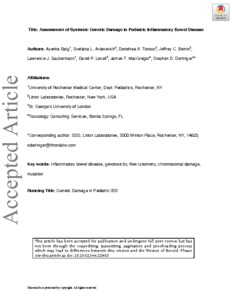Baig, A; Avlasevich, SL; Torous, DK; Bemis, JC; Saubermann, LJ; Lovell, DP; MacGregor, JT; Dertinger, SD
(2020)
Assessment of Systemic Genetic Damage in Pediatric Inflammatory Bowel Disease.
Environ Mol Mutagen, 61 (9).
pp. 901-909.
ISSN 1098-2280
https://doi.org/10.1002/em.22403
SGUL Authors: Lovell, David
![[img]](https://openaccess.sgul.ac.uk/112231/1.hassmallThumbnailVersion/em.22403.pdf)  Preview |
|
PDF
Accepted Version
Available under License ["licenses_description_publisher" not defined].
Download (1MB)
| Preview
|
Abstract
The etiology of distal site cancers in inflammatory bowel disease (IBD) is not well understood and requires further study. We investigated whether pediatric IBD patients' blood cells exhibit elevated levels of genomic damage by measuring the frequency of mutant phenotype (CD59-/CD55-) reticulocytes (MUT RET) as a reporter of PIG-A mutation, and the frequency of micronucleated reticulocytes (MN-RET) as an indicator of chromosomal damage. IBD patients (n = 18 new onset disease, 46 established disease) were compared to age-matched controls (constipation or irritable bowel syndrome patients from the same clinic, n = 30) and young healthy adults age 19 - 24 (n = 25). IBD patients showed no indication of elevated MUT RET relative to controls (mean ± std. dev. = 3.1 ± 2.3 x 10-6 versus 3.6 ± 5.6 x 10-6 , respectively). In contrast, of 59 IBD patients where %MN-RET measurements were obtained, 10 exceeded the upper bound 90% tolerance interval derived from control subjects (i.e., 0.42%). Furthermore, each of the 10 IBD patients with elevated MN-RET had established disease (10/42), none were new onset (0/17) (p = 0.049). Interestingly, each of the subjects with increased chromosomal damage was receiving anti-TNF based monotherapy at the time blood was collected (10/10, 100%), whereas this therapy was less common (20/32, 63%) among patients that exhibited ≤ 0.42% MN-RET (p = 0.040). The results clearly indicate the need for further work to understand whether the results presented herein are reproducible, and if so, to elucidate the causative factor(s) responsible for elevated MN-RET frequencies in some IBD patients.
| Item Type: |
Article
|
| Additional Information: |
This is the peer reviewed version of the following article: Baig, A, Avlasevich, SL, Torous, DK, et al. Assessment of systemic genetic damage in pediatric inflammatory bowel disease. Environ Mol Mutagen. 2020; 61: 901– 909, which has been published in final form at https://doi.org/10.1002/em.22403. This article may be used for non-commercial purposes in accordance with Wiley Terms and Conditions for Use of Self-Archived Versions. |
| Keywords: |
Inflammatory bowel disease, chromosomal damage, genotoxicity; flow cytometry, mutation, 05 Environmental Sciences, 06 Biological Sciences, 11 Medical and Health Sciences, Toxicology |
| SGUL Research Institute / Research Centre: |
Academic Structure > Population Health Research Institute (INPH) |
| Journal or Publication Title: |
Environ Mol Mutagen |
| ISSN: |
1098-2280 |
| Language: |
eng |
| Dates: |
| Date | Event |
|---|
| 17 November 2020 | Published | | 22 August 2020 | Published Online | | 1 August 2020 | Accepted |
|
| Publisher License: |
Publisher's own licence |
| Projects: |
|
| PubMed ID: |
32761646 |
 |
Go to PubMed abstract |
| URI: |
https://openaccess.sgul.ac.uk/id/eprint/112231 |
| Publisher's version: |
https://doi.org/10.1002/em.22403 |
Statistics
Item downloaded times since 10 Aug 2020.
Actions (login required)
 |
Edit Item |



